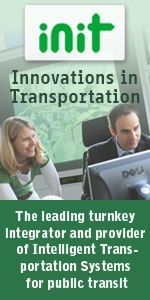

| In This Issue |
| » NEWS HEADLINES |
| » COVERAGE OF THE 2010 APTA RAIL CONFERENCE |
| » COMMENTARY |
| » PEOPLE ON THE MOVE |

The classifieds in this issue offer employment at transit and government agencies throughout North America!
| COVERAGE OF THE 2010 APTA RAIL CONFERENCE |
High Reliability Organizations: When Failure Is Not an Option
BY SUSAN BERLIN, Senior Editor
Rick Hartley, a safety expert from the nuclear industry, presented the essentials of building and maintaining a “High Reliability Organization (HRO)” during the June 9 Closing General Session in Vancouver.
 Hartley—principal engineer with B&W Pantex, which assembles and disassembles nuclear weapons—defined an HRO as “an organization that repeatedly accomplishes its mission while avoiding catastrophic events, despite significant hazards, dynamic tasks, time constraints, and complex technologies.” He noted that his company “has no choice except to be a High Reliability Organization! If we have a bad day, you’ll hear about it. We’re motivated to maintain safety.”
Hartley—principal engineer with B&W Pantex, which assembles and disassembles nuclear weapons—defined an HRO as “an organization that repeatedly accomplishes its mission while avoiding catastrophic events, despite significant hazards, dynamic tasks, time constraints, and complex technologies.” He noted that his company “has no choice except to be a High Reliability Organization! If we have a bad day, you’ll hear about it. We’re motivated to maintain safety.”
He continued: “Why is this so important? Some types of system failures are so punishing that they must be avoided at almost any cost. These classes of events are seen as so harmful that they disable the organization, radically limiting its capacity to pursue its goal, and could lead to its own destruction.” He cited as examples the Three Mile Island nuclear accident in 1979, the Exxon Valdez oil spill in 1989, and the 2003 explosion of the space shuttle Columbia.
He warned that organizations cannot rest on their laurels: NASA had the best Total Recordable Injury Case rate in its history at the time of the Columbia disaster, which caused the death of seven astronauts.
“Many organizations have demonstrated that great safety statistics don’t equal real, tangible organizational safety,” he said. “People confronted with positive stats will become comfortable with good news and insensitive to the possibility of failure, so they will come to believe their own press. In this case, the good is the enemy of the great.” This belief results in what Hartley called a “normal accident organization” as opposed to an HRO.
He quoted John Gardner: “Most ailing organizations have developed a functional blindness to their own defects. They are not suffering because they cannot resolve their problems, but because they cannot see their problems.”
However, Hartley emphasized, creation of an HRO must be a concrete, practical process based on logic and grounded in science. As participants in this effort develop their plans and set their priorities, they must remember the words of Stephen Covey: “The most important thing is, to keep the most important thing, the most important thing.”
Hartley demonstrated the science-based approach required for the creation of an HRO. The procedure comprises four interlocking steps:
* Knowledge of systems: to take the systems approach, understand what a system does for you internally and externally;
* Knowledge of variation: the statistical process;
* Knowledge of psychology: organizational cultures; and
* Knowledge of knowledge: theory, prediction, and feedback as the basis of learning.
Another issue he cited is to “explicitly account for people” while implementing changes, he said. “People are not the problem, but the solution; they are not robots and pounding them won’t improve their performance. People provide safety, quality, security, and science. You must account for the organizational culture if you want long-term, sustained improvement.”
But establishing an HRO is only the first step, Hartley stressed, adding: “It’s harder to sustain a safety culture than it is to get there in the first place.” An organization begins to develop its culture, he said, with values and assumptions imposed by leaders on the group. However, for that culture to endure, the leaders must also look outside and work to integrate external influences.
“Think of the assessment in terms of the problem you want to correct—start with the end in mind,” he said. “Use the tools to get the information required to fix the problem, but not necessarily to fix the culture. If you fix the problem, the culture will follow.”
APTA Secretary/Treasurer Nathaniel P. Ford Sr. presided at the session, which concluded with an invitation by John C. Lewis, chief operating officer of the Massachusetts Bay Transportation Authority, to the 2011 APTA Rail Conference, June 12-15 in Boston.
| « Previous Article | Return to Top | Return to Main | Next Article » |
|
||||||
| AMERICAN PUBLIC TRANSPORTATION ASSOCIATION |
Telephone (202) 496-4800 • Fax (202) 496-4321
Search Back Issues
